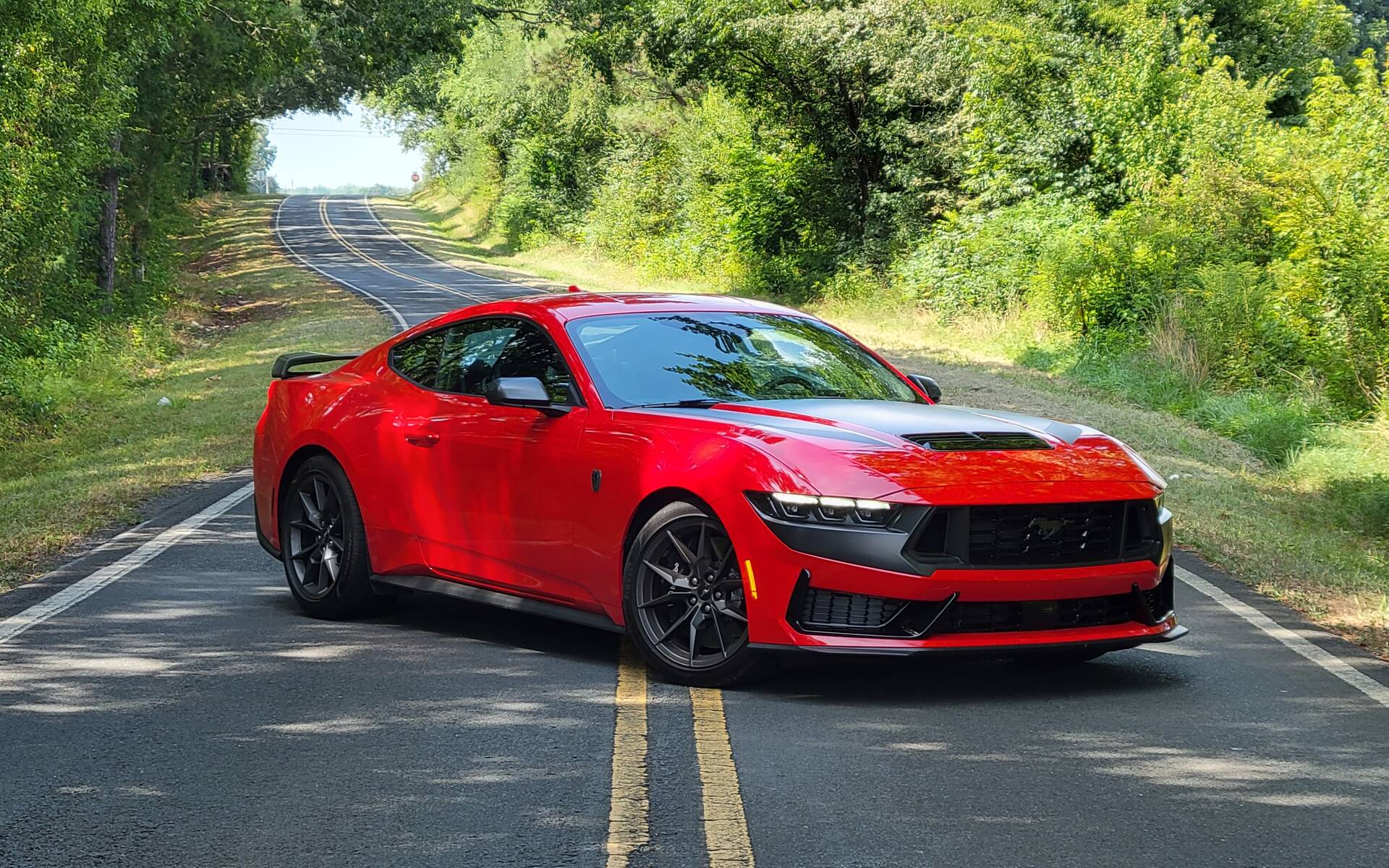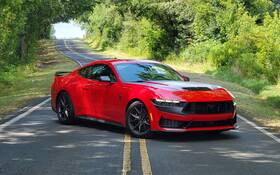2024 Ford Mustang Dark Horse: Track-Ready Thoroughbred

| Strong points |
|
|---|---|
| Weak points |
|
Sport utility vehicles are being launched one after the other these days, and your servants at The Car Guide make sure to cover them assiduously to give you the lowdown on these increasingly popular vehicles. That said, the arrival of a V8-powered sports car paired with a manual gearbox awakens our senses as enthusiasts in a very special way, like a ray of light through this torrent of electric crossovers. A few weeks ago, we tested the 2024 Ford Mustang EcoBoost and GT that kicked off the seventh generation of the popular sports car from the blue oval. Last week, we put our hands on the new performance-oriented member of the Stang lineup, the Dark Horse.
The Stallion, the Coyote and the Rider at Full Gallop
The Dark Horse shares the same 5.0-liter "Coyote" V8 as the GT. However, it benefits from different internals, such as specific camshafts and crankshaft, as well as connecting rods borrowed from the 6th-generation Shelby GT500. With 500 hp and 418 lb-ft of torque, it's the most powerful naturally aspirated 5.0-liter V8 ever to sit under the hood of a production Mustang.
- Also: Ford Mustang GT California Special Returns to Cure Winter Blues
- Also: New Supercharger Kit Cranks Ford Mustang GT Up to 800+ Horsepower

But with only 14 more horsepower than the GT equipped with the active exhaust, the upgrades here are more about endurance than power. The manual gearbox in charge of sending the cavalry to the rear wheels via a Torsen limited-slip differential also differs from that of the GT. It's a Tremec, whereas the gearbox in the Mustang GT is a Getrag. But the Dark Horse can also be ordered with the 10-speed automatic gearbox, which is the same one you will find on the GT.
The "Roval" circuit at Charlotte Motors Speedway, which combines a 24-degree banked section of the oval with a highly technical road circuit in the infield is where we launched this derby at the reins of a variety of testers equipped with various option packages.
In true American V8 fashion, the Dark Horse roars upon start-up, but this rumble is distinguished from that of the GT by being considerably throatier. Floor it and you’ll find that the acceleration is as linear as it is exhilarating, but it is best appreciated with the 6-speed manual gearbox, which is perfectly geared for the task. The 10-speed automatic transmission showed its shortcomings from the get-go, lost between gears and sometimes unresponsive when under pressure.

The Charlotte Motors Speedway banking allowed some drivers to reach 200 km/h if gear changes were well executed and the racing line followed. And as sinister as its name may suggest, the Dark Horse seemed tame and predictable from the very first turns, thanks in particular to its dynamic Magneride suspension and well-calibrated chassis, which made the circuit less intimidating than it looked during the reconnaissance laps. Even in Track mode, where the systems are at their most aggressive, the Mustang remained tolerant and attentive to driver inputs. When things hot rough, the 6-piston Brembo calipers at the front (4 pistons at the rear) took care of keeping things composed with crisp, reactive braking, even after several sessions on the track. And the Dark Horse needs braking, because despite boasting more track-ready features than its stablemates, it's no featherweight. In fact, it weighs between 120 and 160 pounds more than the GT, depending on the transmission chosen.

An optional handling package is available to further increase the Dark Horse’s capabilities on the track, it includes additional aerodynamic elements, stiffer springs, larger front and rear sway bars and wider wheels wrapped in Pirelli P-Zero Trofeo RS tires. With this hardware, the Dark Horse pivots even more easily, allowing the rider to take corners with greater confidence. Even if the car provides plenty of thrills in its normal state, the reasonable price tag on this package could appeal to advanced drivers.
Comfortable Seats in An Average Cruiser
If the Dark Horse's gallop on the track inspires confidence, it should also be the case on the road. But that doesn’t come without its drawbacks. Despite its comfortable Recaro seats, the Dark Horse delivers a pretty rocky ride on rough pavement, even in the most comfortable driving mode.
As far as tech and commodities go, the Dark Horse offers its driver the same combination of screens as on the EcoBoost and GT versions, but they display animations specific to the model. Although the nostalgic character of this new configuration is inexistent, it makes the driving experience and access to the numerous functions and applications a whole lot easier. To add to the model's competitive character, the system even provides access to elements normally reserved for technicians, such as exhaust gas temperature, air/fuel ratios and more.

The Dark Horse Isn’t for Everyone
Once wild and difficult to tame in the corners, the Mustang shows more discipline than ever before for its seventh generation, regardless of the model.
However, with a starting price of $74,850, to which you can add useful technical options such as the $5,600 handling package, or cosmetic (and less useful) ones such as the $6,995 body-painted racing stripe kit, a well-equipped Dark Horse can approach $100,000 once fees have been added.
Hence, Mustang enthusiasts who don’t intend to hit the track on a regular basis should ask themselves whether the Dark Horse is worth the surcharge, given its marginally higher horsepower figure versus the more affordable GT.

At the dawn of the near-complete and probably irreversible electrification of the sports car segment, manufacturers are busy designing last-chance cars, churning out special editions and limited editions, aimed at collectors, avid driving purists and deep-pocketed midlife crisis drivers. The Mustang Dark Horse is one of these exclusive (and somewhat expensive models) that are ideal to ride out the last gas-powered miles.











